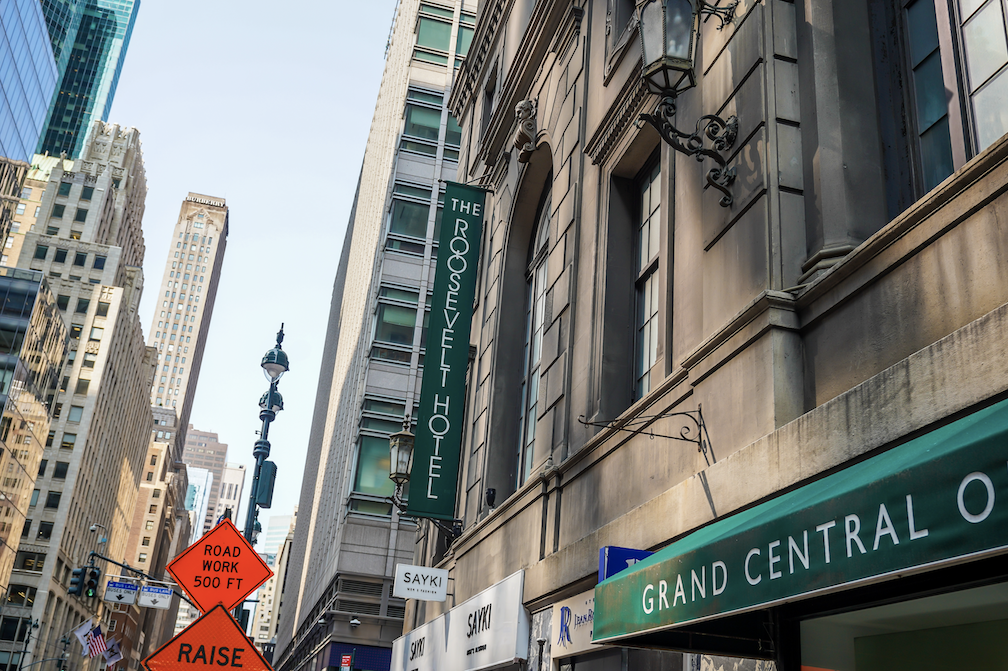No Compromises: How our Union reopened the historic Roosevelt Hotel

After struggling through the first few months of the pandemic, in December of 2020, the iconic Roosevelt Hotel closed. Shuttered and covered in graffiti, the hotel’s 1,025 rooms sat empty even as the city around it began to return to its usual hustle and bustle. As the months dragged on, the hotel’s plans to reopen remained murky and the jobs of over 450 HTC members hung in the balance.
In the three years since, our Union has fought fiercely for these members — in the offices of city officials, at the bargaining table, at the arbitrator’s office, and in court. We had a formidable opponent: the Pakistani government, which is the owner of the Roosevelt.
Our Union won that fight on May 13, 2023. We left the bargaining table with a signed agreement that met every last one of our demands: the hotel’s reopening, voluntary enhanced severance for workers who wished to leave the hotel, and jobs for those who wished to return.
Few other unions are capable of a victory like this. How did we do it?
Our Strategy
Like many hotels that closed during the pandemic, the Roosevelt paid workers their accrued PTO and contractual severance of four days of pay per year of service. As the pandemic started to wane and the city began to recover, Union representatives went to the hotel and demanded updates about their reopening plans. The owners of the Roosevelt told us the hotel closure would be permanent — but refused to share any of their future plans for the building.
That wasn’t good enough. So, the Union’s leadership devised a plan to legally pressure the owners to provide answers and take care of our members.
We know the only language hotel owners speak is money. So, we needed to make the
owners realize that it was more expensive for the hotel to remain closed than to re-open, and for the owners to stay silent than to share their plans with our Union.
Over three years, the Union strategically built financial liability — money the hotel would have to pay if it remained closed by enforcing our contract and legal rights. In the end, the Roosevelt had no choice but to come to the bargaining table and make a deal.
Our strategy had four parts.
Part 1: The City Severance Lawsuit
In 2021, when NYC hotels were recovering from the COVID-19 pandemic, our Union leveraged our political power to help workers who remained on extended layoffs. We worked with former Mayor Bill de Blasio to pass Local Law 104, which required closed hotels to recall at least 25% of their workforce and reopen by November 1, 2021, or make severance payments of $500 per week for 30 weeks to all laid off workers. As a direct result of this law, nearly 30 union-represented hotels reopened to avoid paying out additional severance.
But not every hotel complied; the Roosevelt filed a lawsuit against the City challenging the law in court, and for nearly two years, the Union and our members waited for the Court to issue a decision. Ultimately, the hotel had to pay out the severance required by law, including a steep financial penalty: double the amount in severance payments because of the hotel’s refusal to pay on time.
For our Readers: Unlike other employers, the sovereign nation of Pakistan could not take advantage of bankruptcy court to try and escape their mounting financial liabilities.
Part 2: IWA Article 57 Severance Liability
As the hotel’s closure stretched on indefinitely, it became clear that ownership was likely considering alternate uses for the building. Reports in the press said the Roosevelt may have been heading for residential use. But the owners refused to discuss their plans or confirm if the rumors were true.
At the arbitrator’s office, our legal team skillfully argued that because the hotel did not provide the Union with requested information regarding the future use of the building, an “adverse inference” could be made — meaning, because the owners refused to confirm or deny the rumors, the arbitrator could legally conclude that ownership was in fact planning to convert the building. This meant the hotel was on the hook to pay IWA Article 57 “residential conversion” severance under our contract. We won the arbitration case. Ownership challenged the decision in Federal District Court, where the judge ruled in the Union's favor. Ownership appealed to the Court of Appeals, but a three-judge panel again upheld the Union’s win.
The result: millions of dollars in liability for the Roosevelt, which pushed them further toward a deal with our Union.
Part 3: Pension Withdrawal Liability
When the Roosevelt laid off 90% of their workforce and stopped paying wages, the payments to the Pension Fund also stopped. The Roosevelt was on the hook for withdrawal liability. Withdrawal liability is meant to protect a pension fund from financial harm if a contributing employer pulls out of a pension fund by assessing the employer its fair share of the pension funds’ liabilities for workers. After demands to pay the required withdrawal liability to the Pension Fund went nowhere, the Fund filed a lawsuit against the owners of the Roosevelt for $25 million and beat off the owner’s attempts to get the lawsuit dismissed.
The Union's legal team presented the Roosevelt with two options: pay out the $25 million to the Pension Fund, or sign the reopening deal.
As the hotel sunk deeper into our debt, reopening started to look a little sweeter.
Part 4: Striking a Deal with Mayor Adams
Negotiations heated up, then, in the summer of 2022, thousands of asylum seekers began pouring into New York City. As their numbers grew, City officials began using empty hotels to house new arrivals.
Housing migrants at the Roosevelt was a potential solution. It would reopen the property (and allow for our members to return to work) and provide the revenue the owners needed to pay their liabilities to the workers. Our Mayor, Eric Adams, made it clear that City Hall would not offer the Roosevelt a contract until they negotiated a fair agreement with our Union.
The conversion into a shelter wouldn’t require the millions of dollars needed to renovate the property into a residential or commercial space. After a three year fight, they finally met us at the bargaining table.
Our leadership demanded jobs for our members who wanted to remain at the hotel and a whopping $59 million in severance payments for those who wanted to leave.
The guaranteed revenue provided by the city contract, combined with the legal leverage we had against them, forced the Roosevelt’s hand — and they signed.
Lights On at the Roosevelt
On May 13, 2023, the members of the
Roosevelt voted unanimously – 404 YES to 0 NO – to ratify the new agreement. Since the signing of the agreement, our members from the Roosevelt have received their City severance payments and were able to choose either to go back to their Union job at the hotel, or take home tens of thousands in enhanced severance and walk away.
"I chose to take the enhanced severance, and now I'm able to stay home with my baby," shared Johanna Ortiz, formerly a Housekeeping Supervisor at the Roosevelt. "The money has given me the financial security I need to provide a brighter future for my family. I'm so grateful to the Union for getting us this deal."
"It's been a long, difficult road,” shared Bellperson Phillipe Clarke, who returned to the Roosevelt. “I worked a non-Union job while I was laid off. It was miserable and it barely scratched the surface of my bills. We are so grateful to have something to come back to. It felt like coming home."
We didn’t win this great deal by chance, or
by management’s goodness of heart. We
won it by forging a creative, winning strategy even though the odds were stacked
high against us. It was a years long fight,
but sometimes that's what it takes: when
our members’ jobs and livelihoods are at
stake, the Union never gives up.

Jackson Yeboa, a Houseman from the Roosevelt, celebrates after making his severance election.


